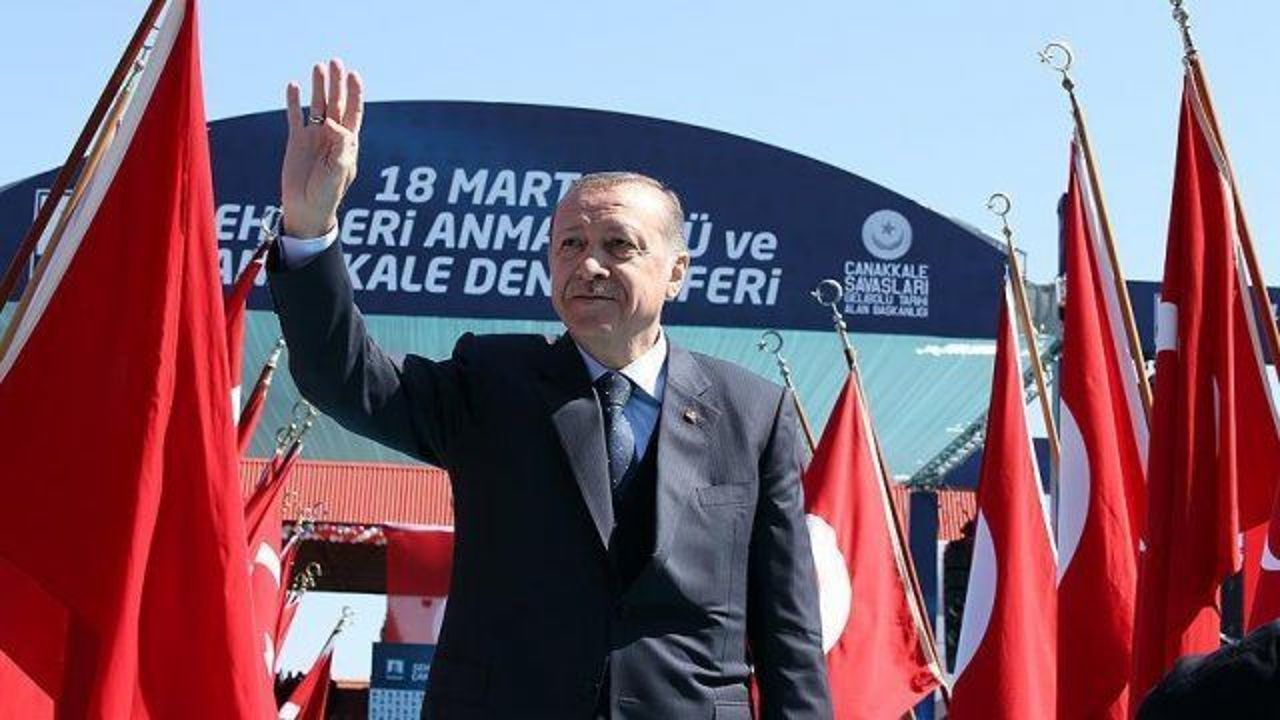'Canakkale bridge opens new era for martyrs', said President Erdogan
The new Canakkale 1915 Bridge in northwestern Turkey will usher in a new era for the martyrs who vanquished their enemies in Canakkale (Dardanelles) 102 years ago, President Recep Tayyip Erdogan said Saturday.

Speaking during the Martyrs' Memorial Day ceremony for the 102nd anniversary of the Canakkale Naval Victory in northwestern Turkey’s Canakkale province, Erdogan said that when completed, it would be the world's number one bridge.
The bridge is expected to be built at a cost of around 10.35 billion Turkish liras ($2.80 billion) and to be under private management for 17 years, and then be transferred to the Turkish government.
"Inshallah [God willing], we'll see the opening of this bridge in five years," on the eve of Turkey’s 2023 centennial, Erdogan said. "This bridge will become the world's number one as we connect Asia to Europe and vice versa."
He added, "It is very important to know what kind of successes the belief and determination of our Canakkale martyrs have brought to us," he said.
The 1915 battle took place in the Dardanelles Strait in the Canakkale province's Gelibolu (Gallipoli) district.
The victory gave Turkey a massive morale boost which enabled it to wage a war of independence and eventually, in 1923, form a republic from the ashes of the Ottoman Empire.
‘April 16 referendum aims to ensure stability and security’
On the upcoming April 16 referendum on constitutional changes to switch Turkey to a presidential system as well as other changes, Erdogan said the changes aim to ensure that Turkey's political system stays stable and secure, similar to the world's strongest nations which use a presidential system.
"If we aim to be among the top 10 economies [by 2023], we need a system through which we can compete with these countries," he stressed.
He added the system would not be a mere copy of other nations’ but includes local and national touches.
According to Erdogan, if the political instability in Turkey since 1991 had never taken place, Turkey’s per capita income would have been double its current $11,000 to be $22,000.
‘Spirit of July 15 similar to our Canakkale forebears’
Erdogan also expressed gratitude for the Canakkale martyrs, and said that during the defeated coup of last July, the Turkish people who rose against the coup forces to protect their country acted in a similar spirit as their forebears did a century earlier.
"There is nothing that people who are bravely ready to be martyrs can't do," he said. "Thanks to the support of our people, we were able to push back the attempt and get rid of the putschists."
Led by U.S.-based Fetullah Gulen, the Fetullah Terrorist Organization (FETO) is accused of orchestrating Turkey’s July 15, 2016, coup plot as well as being behind a long-running campaign to overthrow the state through the infiltration of Turkish institutions, particularly the military, police, and the judiciary.
According to the president, much like the martyrs who protected Turkey during the Battle of Canakkale, the Turkish nation is now fighting terrorist groups in southeastern Turkey such as the PKK as well as across its southern borders in Syria, battling Daesh and the PKK/PYD/YPG.
"This country has not the smallest territory or single person to lose to terrorists or their supporters. So we say 'one nation, one flag, one homeland, one government' at every turn. This is our Rabaa," he said referring to the four-finger hand sign used by Egyptian civilians against the 2013 putsch which overthrew the elected government.
He added that operations against coup-plotters are continuing and said the families of the July 15 martyrs could feel consoled, as the coup criminals will soon be punished.
"After April 16, parliament will take the necessary steps at your request to have a death penalty for criminals," he added.
He added that Turkey would make the necessary response to the Netherlands and other Western countries following the crisis last weekend when two Turkish ministers were barred from entering the country and addressing the Turkish expat community ahead of April 16.
"This [action] has no place in international law," he said. "If you'll continue like this, you'll have the necessary response from Turkey."
Mega projects
Turkey has been working to build giant infrastructure projects across the country to boost economic growth, including Istanbul’s third airport, which will have a capacity of up to 200 million passengers a year.
According to Erdogan, the airport will have a capacity of 90 million passengers in the first quarter next year and 150 million in 2023.
In 2015, Turkey raised the bar with the financial closure of seven projects totaling a record $44.7 billion, according to the World Bank Group.
A total of four mega projects are currently under construction: Istanbul’s third airport, the Gebze-Halkali commuter train link in Istanbul, the Ovit tunnel in northeastern Anatolia, and the Baku-Tbilisi-Kars Railway.
Last year Turkey opened a third bridge over the Bosphorus Strait (the Yavuz Sultan Bridge, named for a 16th century sultan known for his expansion of the Ottoman Empire), plus the world’s fourth-longest suspension bridge over Izmit Bay (the Osman Gazi Bridge), plus the Eurasia Tunnel, which is an underground road link spanning Istanbul’s European and Asian sides.
Anadolu Agency







